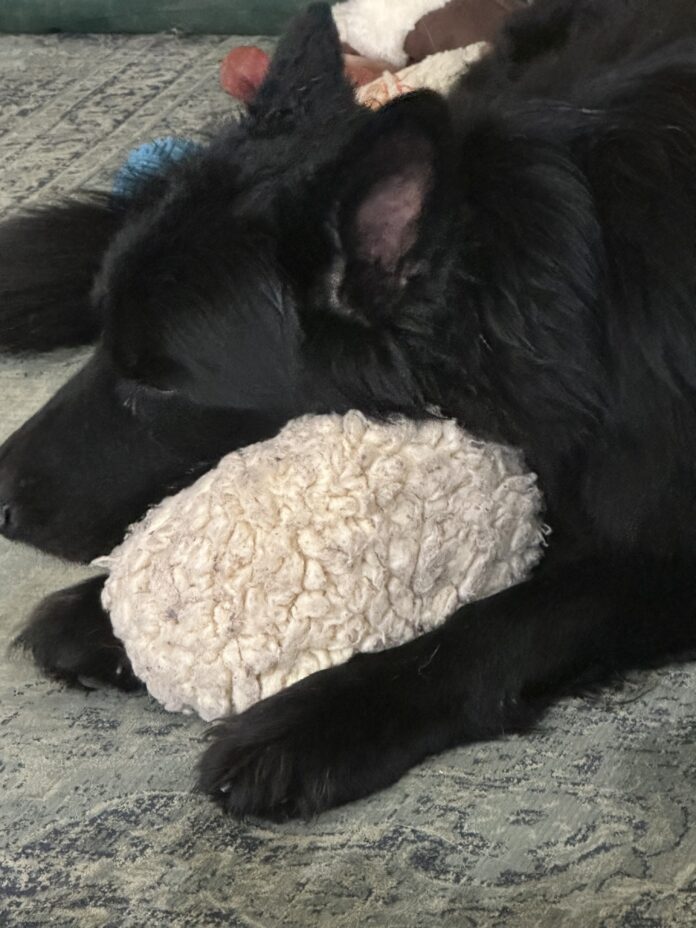BY FRAN JEWELL
Many of my clients know that I have been severely disabled since about mid-August of last summer. At that time, it not only became difficult, but it became impossible, for me to walk or even drive, let alone think like a normal human being because of the pain. In short, the femur head of my hip collapsed like a squished mushroom and the second hip was well on its way. I am still rehabilitating and have a few more weeks to go after two major surgeries within six weeks of each other. However, I always hope that through sharing my disability and what I have learned with my dogs, I can help someone else.
Let’s circle back to how this affected my dogs. Each of them reacted differently. So, it’s important to realize that not only the individual personalities of each dog, but their relationship with you and their breed, all affect what their response will be. However, rest assured that if you pay attention you will see interesting behaviors and find ways to cope with their stress.
The most dramatic behavior response was from my female, Daenera. She was a puppy from my breeding so she has known me since birth. Also, her personality is how I would describe as very “shepherdy.” What does that mean? Well, let me ask you, what comes to mind when you think of a German shepherd? Police dog? Personal protection? Many of these prejudice thoughts about German shepherds are not what a shepherd was bred for, which is sheep herding. Daenera shifted right into a passive protection mode. While she would go out and play with the other dogs and have fun, she would spend almost all of her inside time next to me. When people would come over, she didn’t leave my side. Even people she knew and had huge affection for now no longer had any interest to her. She even growled a few times, but never left my side. In the past, she would certainly bark at the front door but was quick to accept new people.
In her case, you can see how her breed, German shepherd, and her relationship with me, affected her reactions to people coming and going into the house was how her stress expressed itself
Then there is Steel. If you follow me on Facebook, you know that Steel is my diabetic alert dog, my youngest and the golden retriever with German shepherd clothes on. Did he pay more attention? You bet. Was he more protective? Not necessarily, but he insisted on going with me when I had doctor appointments and so on. He kept an even more watchful eye on me. He also started itching. I could find no apparent reason for him to scratch. The scratching was horrible just after the second surgery. This was his way of expressing his stress over my health.
Crowe is my oldest dog. He is usually unflappable, although I did rescue him from an abusive situation. While he has recovered remarkably, what I saw was that he started playing paw-paw and sucking on his sherpa toys way more than usual. Yes, this has been his way to release stress since he returned home from his bad situation, but never to the extent was he doing during my disability. I also noticed more frenetic behavior. He just couldn’t relax, especially at night. Was he nervous about someone coming in? Was it protective German shepherd behavior? I am afraid I can’t answer that, except to say this was and is uncommon behavior for him.
While Daenera’s behavior was the most dramatic, now that I am getting closer to “normal” again, she is, too.
With the parade of people that have been helping me feed them, play with them, in-home physical therapy and a visiting nurse, friends checking on me and bringing me food and Meals on Wheels coming almost every day with lunch, things are still unusual for them. However, because I am less stressed, doing more things for myself and not using a walker anymore, their behaviors are returning to what is normal for them.
What is important for dogs when you are ill or disabled is to continue to be sure they get exercise. If you can identify a friend with good leadership skills that will love your dogs, but will provide some structure for them, you will find they weather the storm nicely. If you see a huge amount of stress, you might seek someone who can do canine massage, acupuncture, essential oils and maybe even your vet for medication if the stress signs are severe. You can add more long-term chews. Chewing is a great way for dogs to relieve stress. What is imperative, however, is that you don’t baby the stressful behavior. If you do, then you are rewarding it and it will continue or get worse.
It is also important that if you have to use tools like a wheelchair, cane or walker, etc., that you accustom your dog to that tool ahead of time, if possible. Lots of food rewards and simple obedience while using the new tool will help dogs to associate that tool with something positive, not something to fear.
Sometimes we cannot plan for a disability like a broken leg from skiing on the mountain. But, when that disability happens, be aware that your dogs can be affected and that there are ways to help them cope. Hopefully, your disability will soon be over and your house will return to normal.



